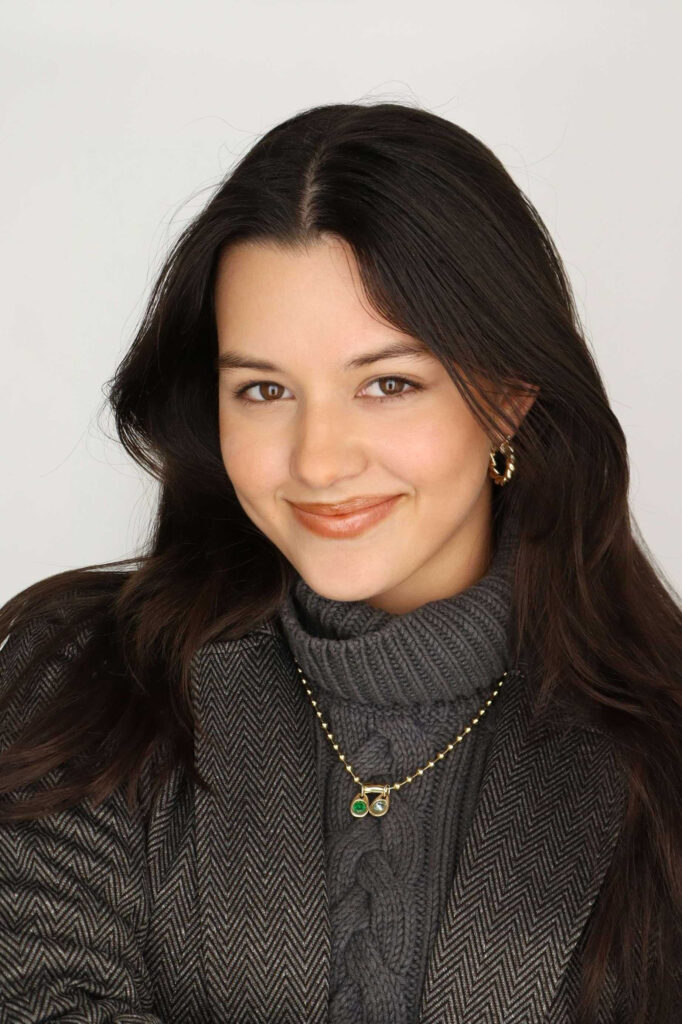Caro ’25 Awarded Prestigious National Association of Hispanic Journalists Scholarship
Mariana Sofía Caro Quintana ’25 was recently named a Rubén Salazar Scholarship winner awarded by the National Association of Hispanic Journalists.
The Journalism major, born and raised in Puerto Rico, answered questions about the scholarship and her career goals.

Q&A with Mariana Sofía Caro Quintana
What does receiving the NAHJ Scholarship mean to you?
Caro: Being awarded the NAHJ Scholarship means the absolute world to me. I remember receiving the email about being selected for the Rubén Salazar Scholarship, and my eyes teared up.
This scholarship is a reflection of my work. I’ve pushed myself to keep publishing in Spanish in a place where English is the dominant language. I wanted to show that Latino news organizations are just as important, no matter their size or language. I also made it a goal to collaborate with as many newsrooms as possible to amplify the Latino community’s presence and importance. So, when I received this scholarship, I felt reassured that what I’m doing is valuable: that I’m reaching my goal of shedding light on the Latino community and all its layers.
How will the scholarship help you?
Caro: This scholarship will help me significantly because it gives me the chance to attend the 2025 NAHJ Conference in Chicago this summer. There, I’ll be able to network with professionals, learn from them, take part in workshops, and meet fellow journalists like me. It’s an incredible opportunity for my career, and I’m excited to gain as many perspectives as I can from people of different backgrounds. I believe that’s the best way to grow and strengthen my skills.
This exposure will also open more doors for me and help me explore different areas within journalism that I’m interested in, and how to connect them. Most importantly, it will give me the space to reflect on what I need to improve as a journalist.
What are your career goals?
Caro: I decided to pursue a bachelor’s degree in Journalism to build up my research and interpersonal skills and learn how to inform accurately while trying to make a positive impact. But at the core of it all, I wanted to understand what’s happening in underserved communities and why they’re struggling. That’s always been really important to me.
That said, my ultimate goal is to become a lawyer who advocates for those communities. But I also want to keep publishing for the rest of my life because journalism, to me, is a constant reminder of humanity and connection. It’s a space to learn deeply and encourage others to learn too.
So while I want to be a lawyer and legislative analyst who helps draft bills, I’ll also continue writing, freelancing for magazines, newspapers, and news sites. I want to cover legislative disputes, political issues, culture, arts, and social movements. I’m especially interested in writing about law, since judicial language can be difficult to understand. I want to be the person people turn to when they’re trying to make sense of a Supreme Court decision, a new law, or policy.
How has Emerson helped strengthen your journalism skills and fondness for journalism?
Caro: What I love about the journalism classes I’ve taken at Emerson is that we learn by doing. In my experience, the way classes balance theory and practice has really worked for me. I appreciated learning techniques on how to take b-roll, for example, and then actually going out to apply them in real time. That hands-on approach made me a better journalist.
I also appreciate having professors with real-world experience who are open to helping you with internships, networking, and more. Knowing that your professor has worked in respected outlets and is still rooting for you is incredibly reassuring.
When I first started studying journalism, I felt like I understood the mission. But it wasn’t until I took a class at Emerson that I truly realized what connects people to journalism, it’s the universal themes that bind us. That’s when everything clicked, and that’s thanks to Emerson’s Journalism program.
Categories